|
Over the past couple of years I've been revisiting personal favourites from 70s American cinema and have found myself saddened for what we seem to have lost. I'm aware that there's a degree of nostalgia involved here – these were, after all, the films that saw me through my teenage years, the ones I rushed to see each week on reruns during my time at film school and from which I learned so much about the craft I was studying. But few would deny that this was a golden period for American film, one in which creative talent was given its head and a project was not greenlighted purely on the basis of the money it might make in its opening weekend. That was soon to change.
One of the many highlights of this period was a cycle of riveting political conspiracy thrillers, which include in their ranks The Parallax View, All the President's Men, The Conversation and, of course, Three Days of the Condor. All are excellent films that are still seen as the product of post-Watergate and post Kennedy assassination paranoia, but which increasingly play as plausible reflections of the corruption, shifty power play and dark politics of government and big business. These were films that did not need to shout to exert an iron grip and were not guaranteed to have an upbeat ending, even if the leading man was a Hollywood star. They were directed in a manner that was tight, economical and unobtrusive, a style that had largely fallen by the wayside until revived by David Fincher for his masterful Zodiac, a film that evoked the time and place in which it was set in part through the cinematic style of the Hollywood thrillers of that period (it also had a score by David Shire, whose music was so much part of the complex fabric of All the President's Men).
Crucially, these were not savvy independent films from budding new directors but prestige studio productions, made during a period of social uncertainty when there was widespread distrust of politicians, corporations and the actions of the security services. It's perhaps a sign of the shifted priorities of Hollywood that today, in a time of potential political upheaval for America, when notions of personal privacy and even traditional concepts of liberty are being gradually eroded, the cinematic response has been almost exclusively confined to independently produced documentaries. Don't worry about what the government and the NSA are doing behind closed doors, and focus instead on who might win a battle between Batman and Superman...
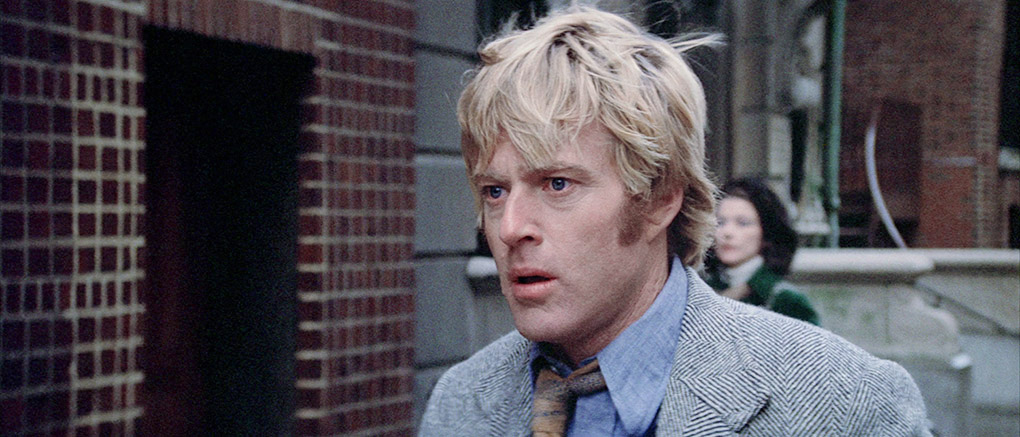
At this point I would usually move onto the specifics of the film under discussion here, but my esteemed colleague Camus reviewed it back in 2004 in his coverage of the earlier Paramount DVD, and as he nailed what it is about it that continues to excite us – as well as what keeps it so politically relevant – we have elected to post an updated version of that review below. Following that, I'll be looking at the technical specs and extra features on this new Masters of Cinema Blu-ray.
Important note: the below review is a retrospective one and contains some major spoilers
for those unfamiliar with the film. You have been warned.
| |
"These activities have their own rules and methods of concealment which seek to mislead and obscure." |
|
President Dwight D. Eisenhower, 1960 |
"sed
quis custodiet ipsos custodes" – "Who guards the
guardians?" |
In
1975, the talented, respected and consistent director Sydney
Pollack made a taut, intelligent and frighteningly relevant-to-today
thriller based on the novel Six Days of the Condor by James Grady. Who noticed? By the time of its release (24th
September 1975) the year had already found its own champion.
1975 was a watershed year for Hollywood. It was the birth-date
of the modern blockbuster. The only movie anyone was talking
about in 1975 starred a 25 foot malfunctioning mechanical
fish named after its director's attorney. There is a perverse
irony in the fact that the year in which Condor was released (a movie most Americans really should have seen)
was the one dominated by Bruce, the great white shark (a movie
most Americans actually saw). While Jaws gobbled up everything in its path, Pollack's thriller made
a nod to the concerns of the day and life, in the United States,
went on regardless.
Mistake.
The concerns of those days and their real life cumulative consequences (namely the events on that infamous date that curiously coincides with the emergency number in the US, 9/11) have been very hot topics ever since. Soon after 9/11, I was reliably informed by my American sources that 75% of Americans believed that Saddam Hussein was the mastermind behind 9/11. Sigh. Osama Bin Laden, the chief US bogey man, one with close family ties to the Bush presidency at that time, was assassinated in Pakistan in 2011 and his body dumped. Since this under-the-radar incident, U.S. internal security has become even more stringent rather than less. Over the last few years, it has become apparent to Homeland security that to catch the evil minnows, you have to trawl for whales. If the ex-NSA employee Edward Snowden's leaks are to be believed and there is no compelling evidence to suggest otherwise, America is – one byte at a time – turning into the United Stasi of America. In the days when rule of law was still albeit roughly in place and in order for the state to do anything beyond the law it had to be deeply covert (because it was unconstitutional and more to the point illegal), we find a simple C.I.A. analyst in Sydney Pollack's 3 Days of the Condor.
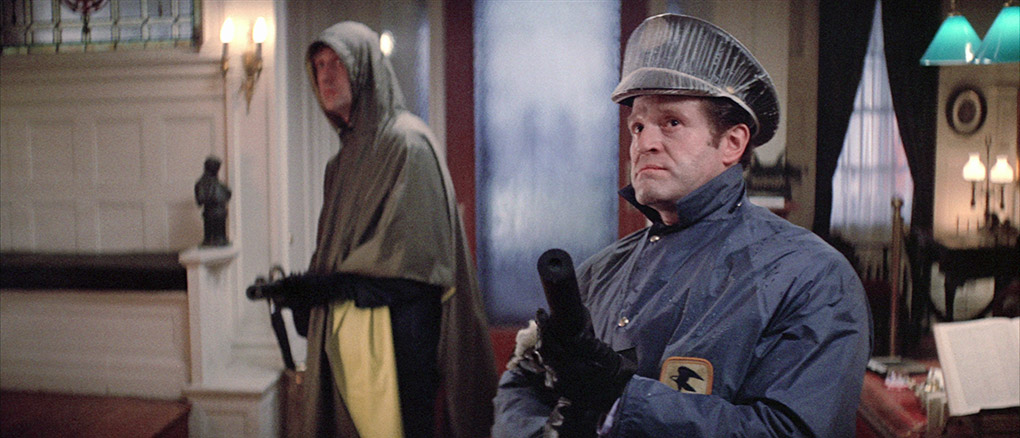
The novel took place over six days and featured a hero who was re-named from Ronald Malcolm to Joe Turner. It's just over 150 pages long and contains merely three set pieces that turned up in the movie – the slaying of Turner's colleagues, the abduction of Cathy and the fight with the mailman. The Macguffin (the Hitchcock phrase for the unimportant reason that motivates the characters' actions) is so mundane in the book (the bad guys run drugs through official CIA channels), it makes what the screenwriters did with Condor even more sublime. There are precedents for movies altering the basic premise of their source material. As an aside my favourite is Goldfinger. In the book, Auric Goldfinger plans to steal the gold from Fort Knox. In the movie, Bond casually rubbishes this plot to his nemesis and then learns that Goldfinger plans to irradiate the gold thereby making his stock of bullion twenty times more valuable. Same thing with Condor. The denouement of the book is 'ho hum drugs, big deal' but the movie's ending is cautionary, desperately dark (if you take it to its evident conclusion) and vibrantly honest. Before the astonishing speech delivered by CIA chief Cliff Robertson, Redford's Turner proclaims "You think that not getting caught in a lie is the same thing as telling the truth."
Now why does that line sum up the political world in place right now (April 2016)? It seems that America's brass haven't seen 3 Days of the Condor. Or if they have, it's time to develop that selective memory. Political undercurrent aside for a moment (we will return to that devastating speech a little later), Condor is a thriller. Despite the trailer's rather lame pronouncement "Redford and Dunaway are in trouble and in love…" Condor is an assured, almost faultless adventure with stars at the height of their fame in 1975. So with All the President's Men a year away, what might have attracted Redford to the source material – a way to make a political statement using the book as 'a cover'? Malcolm loudly farts and burps in the first chapter. Given this, Redford, would have to have found something more aesthetically pleasing about his character to take on the role. Redford – the star of the seventies in my book – pushed for the political, as far as a mainstream movie could question prevailing policies and wisdom. The book was stripped of its three assets and fashioned into something with a lot more weight. We can at least acknowledge the people behind that decision – probably Redford given his oeuvre of noteworthy political movies – but also Pollack, producer Stanley Schneider and screenwriters, Lorenzo Semple Jnr and David Rayfiel.
Before we take a look at the movie itself, there are five minor asides that are worth a mention. The book is set entirely in Washington DC. For some reason, the film-makers decide to use New York as Redford's base with his chief ensconced very high up in a building that doesn't exist anymore. The twin towers appear three or four times (there're even scenes shot inside looking down on the city and one at what is now a new development with a memorial centre). You can't help but think of 9/11 all the way through. Secondly, if I had to criticise some aspect of the production it would be the opening cue; a jazzy, Starsky and Hutch funk that doesn't tease out the darker elements of the story at all. It's too hip a theme that also effectively nails down its era. It's also refreshing to hear characters give out real telephone numbers instead of the obligatory '555' dummy number that grates whenever I hear it in modern films. The end titles are also noteworthy for being forty-two seconds long. Watch the end credits of any modern film and that little Condor roster of names almost becomes a short avant-garde film in itself. The final aside is the artwork on the Blu-ray cover. The 2009 US release still foregrounds the Redford/Dunaway pair up with the naked clinch that made the original DVD cover so tacky still in the right hand lower corner. Yes, the tag line is a little more relevant – "Be careful who you trust," even though there's a sound argument for the 'who' to be a 'whom'… This Eureka Masters of Cinema version has got the cover spot on for my money – conspiracy, big brother etc. – and includes a sly reference to Blade Runner's promotional iconography.
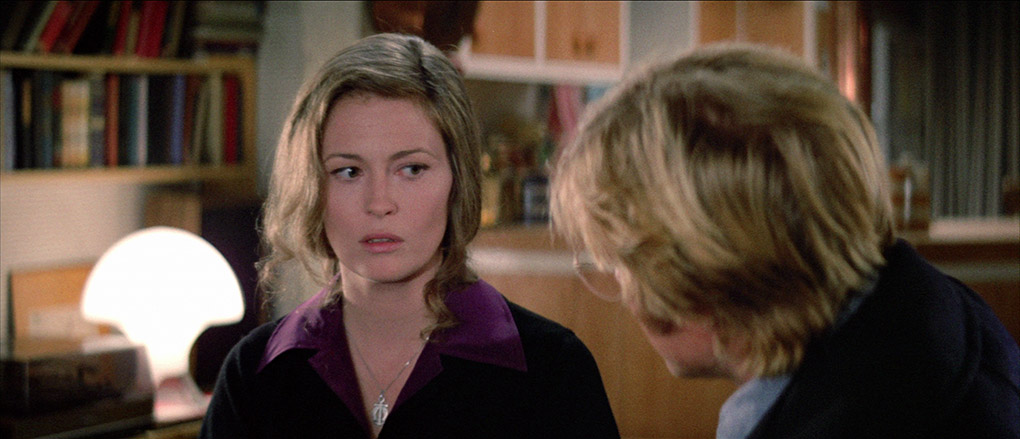
Redford is completely convincing as the harassed, bookish Condor despite the actor's reputation for action in the late sixties and early seventies. His grace and physicality fit the mid-70s so well, it's hard to believe flares ever went out of fashion. Faye Dunaway plays the role of frightened, lonely Cathy with exactly the right amount of fear and bewilderment. Both central performances are pitch perfect. Robertson as CIA Chief Higgins brings the right amount of gravitas to a role that could be speaking for the entire US government. Rounding out the cast is Max von Sydow (whose youthful appearance must have come as quite a shock to those of us fooled completely by Dick Smith's extraordinary 'old man' make up on him in The Exorcist a few years earlier). He plays an assassin and he is unerringly convincing (not that I meet too many assassins in the course of my daily round).
Redford's character, Joseph Turner (in a spy movie, there's a lot to the name 'Turner') is resolutely American and proud of it. He'd 'miss it' if he left. In Condor, it's the assassin, Joubert, (painted curiously not strictly as the bad guy) Max von Sydow, who 'prefers Europe'. It falls on Turner's all American shoulders to uncover what is never said about how his beloved democracy is maintained. Turner is a CIA researcher/reader whose theories about an obscure book printed in Arabic languages uncovers an internal CIA renegade plot to invade the Middle East. He doesn't know this at the time and fearing discovery, the renegade chief inside the CIA has Turner's entire division (operating covertly as an Historical Society) wiped out by professional hit men. Turner, out getting lunch, returns to find his people all dead. He's now out of his depth (he's a reader not a field agent) and scared, especially after the first time the company make contact, one of their number tries to kill him.
The film takes a necessary but uneasy lurch into sexual politics as Turner kidnaps Cathy, who inadvertently offers a random escape route. Their relationship is a fascinating one, a condensed example of Stockholm Syndrome when the captives form a bond with their captors. In the book it is Cathy who is the sexual predator thrilled by the arrival of Malcolm in her midst. The movie plays Redford as desperate, keeping Cathy physically close so she can't run. Cathy initiates sexual contact. You have to remember this is Robert Redford in his hey day. Not that a man's attractiveness nullifies his predatory potential. The next morning brings the stand out fight scene with the bogus mailman. The sound effects here are also noteworthy. Each blow is accompanied by breathy exertions that give the powerful scene some originality. It's also a dirty fight that harks back to the days of Connery and Shaw on the Orient Express.
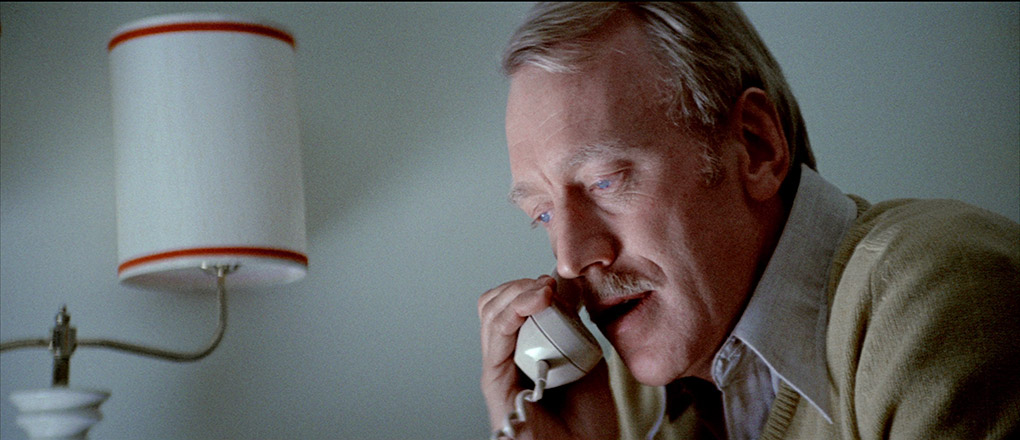
Redford untangles the plot as he dodges the bullets and with Cathy as his partner, makes a successful attempt to understand the Macguffin. When it comes it's a little revelation that grows on you as you begin to think about what's going on in the Middle East today. "Oil…" says Redford. It's a sublime moment given that the United States' very stability is based on its acquisition of enough oil to keep the engines going. The US government spends more than twenty seven billion dollars a month on imported oil which coincidentally makes up of twenty seven percent of its total oil needs. That's not small change. Even the mightiest power on Earth will play dirty to maintain its supply. It's Condor's frankness that startles here. And to prove this I'll quote CIA Chief Higgins as he explains the CIA's actions;
HIGGINS |
It's
simple economics. Today it's oil. In ten or fifteen
years it's food. Plutonium. (Ed's note: : forty-one years on, it's still oil). Maybe even sooner. Now what do you think
the people are going to want us to do then? |
| |
TURNER |
(defending
his ideal of democracy)
Ask them. |
| |
HIGGINS |
Not now. Then. Ask them when they're running out. Ask
them when there's no heat in their homes and they're
cold. Ask them when their engines stop. Ask them when
people who have never known hunger start going hungry.
You want to know something? They won't want us to ask
them. They'll just want us to get it for them. |
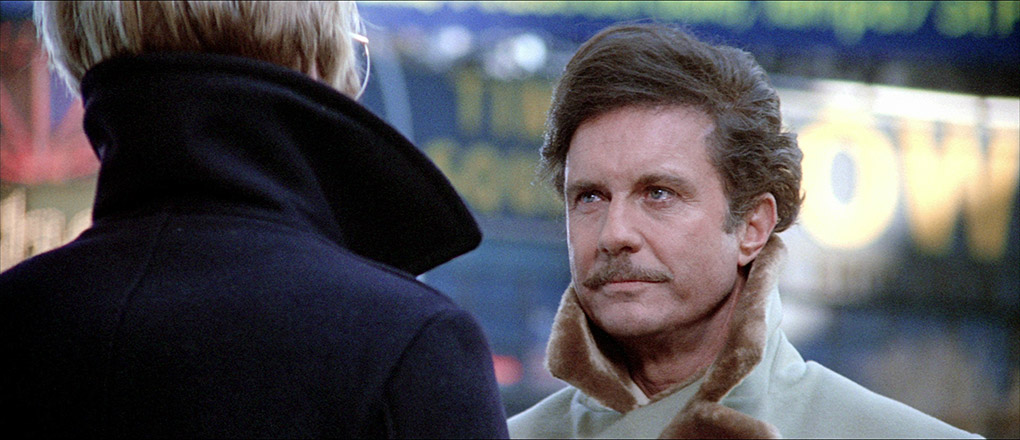
At this point, Redford has no real retort because what Higgins is saying is what defines the US government. Instead Redford's only reply is a stinging criticism of Higgins personally.
TURNER |
Boy,
have you found a home. |
When I first heard this speech I was awed by the ambivalence that rose up in me. One side of me said "I enjoy extraordinary privileges living as a Westerner cosseted by a government that do the things covertly that I couldn't condone as an individual," and yet the other side of me was screaming "Ah, yes but you are condoning it – the oppression of others – so you can drive to the coast and live in relative luxury while people living thousands of miles away indirectly and directly suffer." It's a rare movie that sparks these debates wrapped in such an entertaining way. It's an even rarer one when it comes out of Hollywood. 3 Days of the Condor is a movie that recognises, that the US and western way of life comes at a high price. We should ask if others need to pay that price so highly.
Restored, I'm guessing, by Paramount (there's a disclaimer from them at the head of one of the special features), the 2.35:1 1080p transfer here is absolutely top notch in every respect. The detail is crisp, the contrast spot on, the black level solid without punishing shadow detail and the picture is completely free of damage and dust spots. Particularly attractive are the warm pastel tones of the colour palette, which are beautifully rendered here, and together with the fine film grain and that indefinable quality to the image that makes you want to reach in and hug it, they sing a loving hymn to the wonders of 35mm film and pre-digital grading.
There are, unexpectedly, two soundtrack options, Linear PCM stereo 2.0 and DTS-HD Master Audio 5.1 surround. I initially presumed that 5.1 was a more recent remix, but sonically the two tracks are very similar, the key difference being that the dialogue sits centrally on the 5.1 and is spread across the front speakers on the stereo track. There is some distinct stereo separation on both tracks, but I was unable to detect any activity at the rear on the 5.1. Inevitably, there is some range restriction (no big bass punches here), but both tracks are clear and free of damage and background hiss or crackle, and the dialogue and music are very cleanly reproduced.
Optional English subtitles for the deaf and hearing impaired are available.
Sheldon Hall (21:53)
Film historian Sheldon Hall delivers a compelling examination of the film and of Pollack the director, including his long-standing working relationship with Robert Redford and the socio-political context in which the film was made. He draws intriguing comparisons between Three Days of the Condor and Hitchcock's The 39 Steps, and suggests that "If you don't find a figure like Pollack interesting, I think you don't find Hollywood interesting."
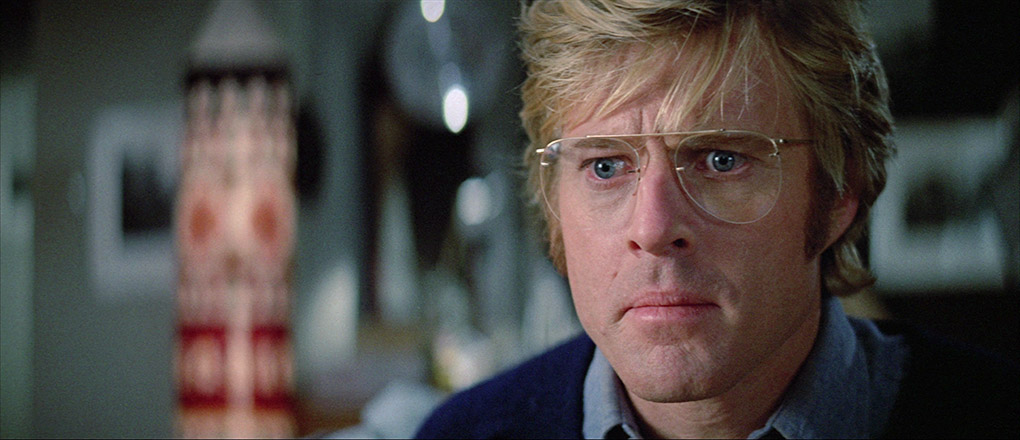
The Directors: Sidney Pollack (59:46)
Another in that American TV series with the cheesy opening titles and constructed around an interview with the subject of the episode in question. Pollack takes us on a whistle-stop trip of his film career, with brief contributions from actors Cliff Robertson, Meryl Streep, Harrison Ford, Julia Ormond, Paul Newman, Sally Field and Charles Durning, as well as producer Jerry Weintrab, whom Pollack persuaded to take a supporting role in The Firm. There's not much depth, but it's still engaging viewing and a solid enough introduction to Pollack's work.
Trailer (3:04)
A neatly assembled trailer that's in very good shape but is plastered with spoilers, so watch this later.
Booklet
Boasting a very nice cover that suggests this is a classified CIA document, this typically well produced MoC booklet gets off to a fine start with a terrific essay on the film by Michael Brooke, one that quotes the very same climactic monologue from Higgins that you'll find in Camus's review (and was also in his original 2004 review, so I'd say we're squarely off the hook on any copying charges). This is followed by a lengthy and hugely informative chat between Pollack and fellow director John Boorman, which was originally published in 1994 in Projections 3: Filmmakers on Filmmaking. Also included are notes on viewing and credits for the film. The use of the 70s computer font used for the film's main credits is a nice touch.
One of the great conspiracy thrillers of 70s American cinema gets a damned fine Blu-ray release from Masters of Cinema, one that boasts a delicious transfer, a couple of well targeted on-disc extras and a splendid booklet. Highly recommended, and for fans of 70s American cinema this is an absolute must-have.
|